
- Seth Thomas Clock
- Brand
- Antique Face Marked (4)
- Chelsea (2)
- Clock (29)
- Coca Cola (7)
- Fashion (2)
- Gilbert (3)
- Herschede (3)
- Howard Miller (6)
- M Low (3)
- Sessions (4)
- Seth Thomas (3440)
- Seth Thomas & Sons (2)
- Seth Thomas Clock (7)
- Seth Thomas Sonora (3)
- Thomas Seth (3)
- Undisclosed (2)
- Unknown (3)
- Unsigned (2)
- Waterbury (3)
- Westminster (3)
- ... (2157)
- Maker
- Military Branch
- Movement
- Style
- Americana (46)
- Antique (1003)
- Art Deco (77)
- Art Nouveau (29)
- Beehive (9)
- Colonial (17)
- Empire (12)
- Gothic (16)
- Mid Century Modern (9)
- Mid-century Modern (6)
- Modern (8)
- Nautical (23)
- Steeple (43)
- Tambour (5)
- Traditional (21)
- Unknown (11)
- Victorian (42)
- Vintage (6)
- Vintage / Retro (72)
- Westminster (6)
- ... (4227)
- Type
- Adamantine Clock (19)
- Bracket Clock (37)
- Clock (48)
- Clock Parts (18)
- Clocks (38)
- Deck Clock (27)
- Desk Clock (401)
- Mantel (64)
- Mantel Clock (260)
- Mantel Shelf Clock (28)
- Mantle (146)
- Mantle Clock (328)
- Mantle Shelf Clock (21)
- Regulator Wall Clock (28)
- Shelf Clock (26)
- Ship's Bell Clock (51)
- Ship's Clock (139)
- Steeple Clock (22)
- Wall (14)
- Wall Clock (193)
- ... (3780)
Crystal Gilt Brass Regulator Seth Thomas Shelf Clock French Empire Beveled Glass
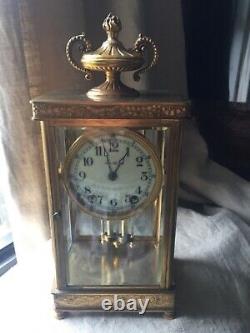
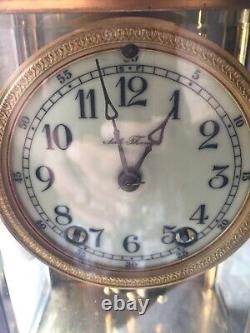
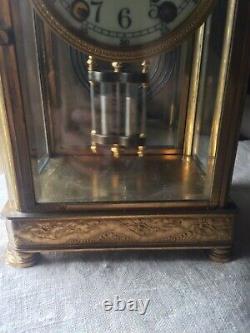
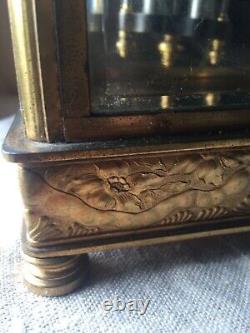
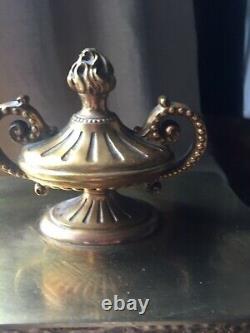
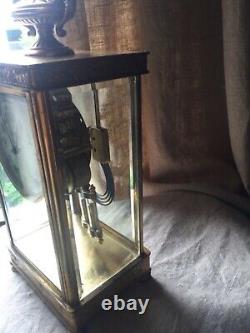
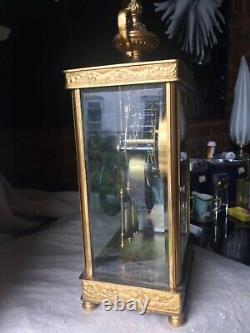
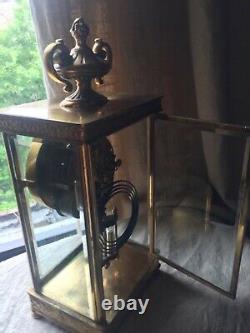
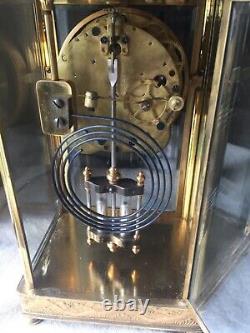
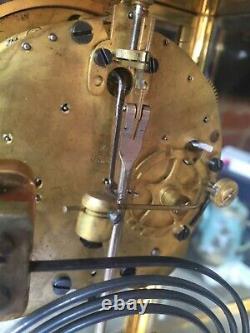

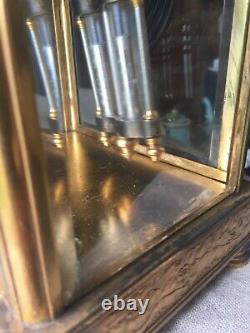


For your consideration is a rare French style Seth Thomas Empire mantel clock. CRYSTAL REGULATOR CLOCK - Seth Thomas Napoleon III Style Shelf Clock, in a brass case with beveled glass, gilt ormolu mounts; urn at top, Bun feet at lower corners.
It has 2 doors, one in front and one in back. Beveled glass on all 4 sides. Beautiful brass design with 4 feet. It has a mock mercury pendulum. This is an 8-day clock.
Porcelain dial with design around the numbered face. Marked on the movement 48N. It does not have a key with it, but is a size 6. Clock stands 14 3/4" tall and is 6 1/4" wide and 5 deep.
No chips in the face or glass. Doors open and close correctly. What a wonderful piece to display and use. Good condition small tiny imperfections in the glass at the side lower corner.Look at the last picture , wear to gilding. Check back often as I list new items frequently, and make sure to stop by my store to see all items listed.
Seth Thomas was born in Wolcott, Connecticut in 1785, the fifth of seven children of Scottish immigrant, James Thomas, a cooper, and his wife Maria Ward. Connecticut, incidentally, was an important and expanding hub in the American clockmaking trade. Seth had a natural ability for carpentry and he probably obtained his knowledge and interest in mill property and manufacturing from this. He had imited formal education and left school at an early age to become an apprentice carpenter and joiner to Daniel Tuttle, of Plymouth. Subsequently, he became a skilled woodworker and built houses and barns in the nearby towns around Farmingbury/Wolcott (incorporated 1796).
In the early 1800s, Seth attempted to set up a clock-making industry in Wolcott. He made his first clock in his family's house. The woods around the house were filled with mountain laurel trees; many Wolcott men worked cutting the trees and sawing them into thin slices, which, when seasoned, were used for the wooden wheels of the clocks. The women of the town spun flax (cotton) into cords and these were used to hold the clock weights.
As a result, the town of Wolcott profited to some extent from the Thomas enterprise, the short time it was located in Wolcott. In 1807, Seth moved to Plymouth. There he joined Eli Terry and Silas Hoadley in a business of making clocks at a wholesale rate. Seth mainly worked on fitting the wheels and different clock parts together. From 1807 until 1810, they made 4000 clocks of the "hang-up" or "wag-on-the wall" type.
These clocks did not have cases, but buyers who wanted cases for their clocks hired carpenters to build what they called "grandfather cases" for them. The land included a clock factory and was conveniently located near Eli Terry's new shop where was the non-compete agreement? Thomas continued Clark's wooden movement tall clock production, and about 1817 began making the wooden movement shelf clock. These were cased in pillar and scroll cases until 1830, when the bronze looking glass and other styles became popular.
In 1842, brass movements were introduced, and first cased in the popular O. Case (which was made until 1913). Wood movements were phased out in 1845. The Seth Thomas Clock Company was organized as a joint stock corporation on May 3, 1853 to succeed the earlier clockmaking operation of the founder.
Seth's first wife was Philinda Tuttle; they married in the early 1800s and had a daughter, Philinda. His second wife was Laura A. They had six children Seth, Martha, Amanda, Edward, Elizabeth, and Aaron. And Aaron went into the clock business with their father, subsequently enlarging the clock factory and developing it into a worldwide business. After Thomas' death in 1859, the town of Plymouth CT was renamed "Thomaston" in his honor.At that time, Aaron became President and began to add new products. Huntington and Harvey Platts of Ithaca, New York and added three models to their line that year.
The earliest of the clocks indicate only three patent dates on the dials, September 19, 1854, November 17, 1857 and January 31, 1860. The fourth and final patent of March 1, 1862 is carried on most of their calendar clocks manufactured until 1875 or 1876. On February 15, 1876 Randall T. A Thomas relative and workman in the factory, received a patent on an improved mechanism.
This was put into production and utilized on all later perpetual calendar clocks until the last model was dropped in 1917. Regulator clocks were introduced in 1860. Spring driven clocks were introduced ca.
Perpetual calendar clocks were made from ca. 1895; black (Adamantine finish) wood mantel clocks, ca.1895; oak kitchen clocks, 1890-ca. 1915; tambour clocks, introduced in 1904; chime clocks, introduced in 1909; and electric A/C clocks, introduced in 1928. The Seth Thomas Clock Company was very prosperous into the 20th Century and was considered the "Tiffany's" of Connecticut clock manufacture, even by their competitors. Between 1865 and 1879 they operated a subsidiary firm known as Seth Thomas' Sons & Company that manufactured a higher-grade 15-day mantel clock movement and during that period were major supporters of a New York sales outlet known as the American Clock Company. Many Seth Thomas clocks from 1881 to 1918 have a date code stamped in ink on the case back or bottom.
Usually, the year is done in reverse, followed by a letter A-L representing the month. For example, April 1897 would appear as 7981 D. On January 1, 1931, the firm became a subsidiary of General Time Instruments Corporation and soon passed from family control. In 1955, a flood badly damaged the Seth Thomas factory. They phased out movement manufacturing and began importing many movements from Germany.
Hermle, in the Black forest of Germany, has made many movements for Seth Thomas clocks. It was reported in 1988 that the firm was all but dissolved. In June 2001 General Time announced that it was closing its entire operation. The Colibri Group acquired Seth Thomas. In January, 2009, The Colibri Group unexpectedly shut its doors, laying off its 280 employees and preparing to sell all remaining jewelry, gold and silver to pay creditors.
The following message appeared on the Colibri website: February 16, 2009: The Colibri Group is currently in receivership and is not accepting any orders at this time. We will update this message as new information becomes available.We are sorry for the inconvenience. Thank you for your patience. This item is in the category "Collectibles\Decorative Collectibles\Clocks\Desk, Mantel & Shelf Clocks". The seller is "antikl0ver" and is located in this country: US. This item can be shipped to United States, Canada, United Kingdom, Denmark, Romania, Slovakia, Bulgaria, Czech Republic, Finland, Hungary, Latvia, Lithuania, Malta, Estonia, Australia, Greece, Portugal, Cyprus, Slovenia, Japan, China, Sweden, South Korea, Indonesia, Taiwan, South Africa, Belgium, France, Hong Kong, Ireland, Netherlands, Poland, Spain, Italy, Germany, Austria, Bahamas, Israel, Mexico, New Zealand, Singapore, Switzerland, Norway, Saudi Arabia, United Arab Emirates, Qatar, Kuwait, Bahrain, Republic of Croatia, Malaysia, Chile, Colombia, Costa Rica, Panama, Trinidad and Tobago, Guatemala, Honduras, Jamaica, Barbados, Bangladesh, Bermuda, Brunei Darussalam, Bolivia, Egypt, French Guiana, Guernsey, Gibraltar, Guadeloupe, Iceland, Jersey, Jordan, Cambodia, Cayman Islands, Liechtenstein, Sri Lanka, Luxembourg, Monaco, Macau, Martinique, Maldives, Nicaragua, Oman, Pakistan, Paraguay, Reunion.
- Brand: Seth Thomas
- Type: Desk Clock
- Character: Clocking
- Clock Type: Shelf Mantle clock
- Style: Empire
- Frame Material: Gilt
- Material: Glass
- Featured Refinements: Antique French Clock
- Finish: Brass
- Modified Item: No

